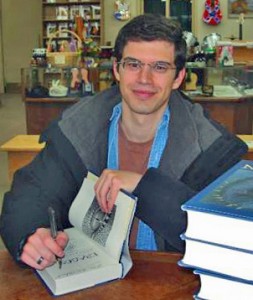I want to address without sarcasm (exceptionally for me) the common question: ‘Will you ever write books for adults?’
As a children’s author, it’s easy to take offence. Even if the asker is very tactful (which they rarely are), it’s impossible to miss the implicit assumption that children’s literature is ‘less good’; that there should be a ‘natural’ desire to graduate from one to the ‘next’.
I don’t want to write about the fact that children’s literature actually allows you to deal with themes ‘that are too large for adult fiction’, because Philip Pullman’s done it and there’s nothing to add.
I will write, instead, about one context in which this question can be valid: when it is put to youngish authors who started publishing children’s books when they were themselves barely out of adolescence.
In this case, the questioner can mean well. S/he is assuming that the young author has been writing children’s or YA literature because they are still young adults themselves; therefore they are perhaps currently interested in specific topics of childhood and adolescence. But as they mature, they might become interested in ‘adult’ concerns (whatever those are) and they might need their writing to reflect that.
It’s not idiotic to suggest that someone who isn’t an adult yet might gradually find that their experiences are changing, making them want to write about their new worries, beliefs and questions – things like libido, professional dilemmas, marital bliss, parenthood, midlife crises, and incontinence. Since those are not topics which fascinate the average child, they would probably be aimed at older generations.
In this context, the question shouldn’t be taken as offensive. But it is still useless. My only reply can be – How would I know? If I haven’t experienced yet what I might want to write about, how can I know if I’ll want to write about it? Sure, it might happen. It might also happen that I’ll write a non-fiction book on breeding Irish setters. I haven’t yet discovered the joy of breeding Irish setters, just as haven’t yet discovered the joy of mortgages, marriages and baby carriages. When I do, sure. It might happen.
But it might also happen that these boring problems concerns linked to my evolving experiences will not find their way out of my system through fiction-writing. Writing fiction doesn’t define my life. I’m also an academic researcher, I’m also someone who talks (a lot), I’m also a reader, a museum-goer, etc. The assumption that I should channel every experience into writing is simply false.
It’s reductive to assume that people only write about what they actually experience. It’s reductive to think that the evolution of their concerns will ‘naturally’ make them want to cram them into their fiction-writing, as if there was no other way of letting off steam. There may be a thousand reasons why I could prefer my fiction to continue exploring topics that pertain to childhood. Maybe I find that reading about more ‘adult’ concerns, or talking about them, or watching films about them, helps me deal with them better than through writing.
Part of the mystique around writers and writing is the assumption that there is a compulsive wholeness to a writer’s life – as if it was impossible for ‘proper’ writers to have a private/ professional life divide, to have independent experiences, independent thoughts that will never surface in their works.
But it’s not dreams, it’s books. It’s not free-flowing speech on a psychoanalyst’s couch, it’s structured writing filtered by agents, supervised by publishers and sculpted by editors and copyeditors. It’s not something I can’t help. I’m not the neurotic scribe of my every experience, I’m a person who makes deliberate choices about what I want to tackle through fiction.
If I start writing ‘for adults’, it won’t be because I’ve had experiences that suddenly ‘possess’ me, that ‘ask’ to be written down. It will be because I’ve found that some of my new concerns can be explored in ways that I find enriching and that could constitute an interesting career move.


